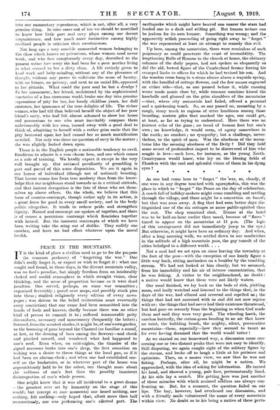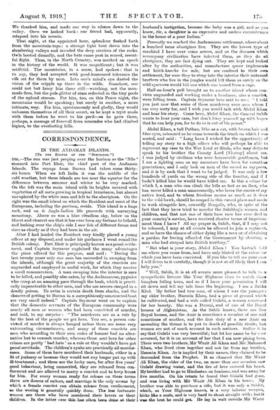PEACE IN THE MOUNTAINS.
TT is the kind of place a civilian used to go to for the purpose
(in common parlance) of "forgetting the war." One didn't really forget it, or expect or wish to forget it : what one sought and found, in those days, in the distant mountain valley, was no fool's paradise, but simply freedom from an intolerably choked and sordid atmosphere in which straight vision, clear thinking, and the sense of proportion became as it were dead faculties. One served, perhaps, on some war committee; organized feverishly ; pored over maps, and possibly stuck pins into them ; studied religiously every edition of every newspaper ; was driven to the belief (reiteration must eventually carry conviction) that our came had been committed into the hands of fools and knaves, chiefly because there was no other kind of person to commit it to ; suffered innumerable petty discomforts, necessary and unnecessary (frequently the latter); listened, fromthe scented shades, it might be, of one's owngarden to the booming of guns beyond the Channel (as familiar a wind' at last, as the droning of bees among the flowers)—and shook and pinched oneself, and wondered what had happened to one's soul. Even when, on raid-nights, the thunder of the signal maroons broke into one's sleep, the first sensation on waking was a desire to throw things at the local gun, as if it had been an alarum-clock ; and when one had established oneself on the backstairs, or in whatever part of the house was superstitiously held to be the safest one thought more about the coldness of one's feet than the possibly imminent disintegration of one's whole person.
One might know that it was all incidental to a great drama —the greatest ever set by humanity on the stage of this world; but (except at rare moments) one heard nothing, saw nothing, felt nothing—only hoped that, albeit more than half unconsciously, one was _performing one's allotted part. The earthquake which might have heaved one nearer the stars had landed one in a dark and stifling pit. But human nature can be jealous for its own honour. Something was wrong; and the apparently selfish proceeding of going right away to " forget " the war represented at least an attempt to remedy this evil.
Up here, among the mountains, there were reminders of such poignancy as could penetrate the crust of insensibility. The lengthening Rolls of Honour in the church at home, the obituary columns of the daily papers, had not spoken so eloquently as did the old, bowed figure of the Cumberland farmer forcing his cramped limbs to offices for which he had trained his son. And the wooden cross hung in a stone alcove above a wayside spring, with the handful of cottage flowers, and the few names engraved on either side—that, as one paused before it, while running water made music close by, while summer sunshine kissed the harebells and glanced on the grim shoulders of the mountains —that, where city memorials had failed, offered a personal and a quickening touch. So, as one passed on, mounting by a rough, stony track to regions of utter loneliness among those brooding, austere piles that mocked the ages, one could get, at least, as far as trying to understand. Here there was no faintest echo of the gulls; no tread of human foot but ono's own ; no knowledge, it would seem, of agony somewhere in the earth; no comfort ; no sympathy; but a challenge, nevertheless, to the spirit of man. Was the aloofness of the mowntalus like the seeming aloofness of the Deity ? Did they hold some secret of profoundest import to be discovered of him who sought in love—such love, for instance, as the young NorthCountryman would know, who lay on the blazing fields of Flanders with the cool and splendid vision of them in his dying
eyes ? a a a
As one had come here to " forget " the *war, so, clearly, if one were in any degree touched with agoraphobia, this was the place in which to " forget " the Peace on the day of celebration. A coach full of holiday-makers might come rumbling and rattling through the village, and there might be a concertina on board; but that was soon away. A flag that had seen better days distinguished one of the six cottages as more public-spirited than the rest. The shop remained shut. Dinner at the hotel was to be half-an-hour earlier than usual, because of " flares " timed to appear on the mountains at 11 p.m. (The logic of this arrangement did not immediately jump to the eye.) But otherwise, it might have been an ordinary day. And when, after a long morning walk, we settled down to our sandwiches in the solitude of a high mountain pass, the gay tumult of the cities belonged to a different world. . . .
Not a soul had we set eyes on since leaving the township at the foot of the pass—with the exception of one lonely figure a little way back, sitting motionless on a boulder by the tumbling stream. We had not looked at him closely, but we assumed, from his immobility and his air of intense concentration, that he was fishing. A visitor to the neighbourhood, no doubt : a native would know that these were not likely waters.
Our meal finished, we lay hack on the beds of rich, yielding moss, and lazily watched and listened to the things that, in the days of the war, had allured and arrested and repelled us ; the things that had not mourned with us and did not now rejoice with us; the things that had never had their existence threatened, but had gone on serenely from the beginning as when God made them and said they were very good. The wheeling hawk, the careless butterfly, the cottonearass bending to an air that knew no taint, the bubbling brook,. the mighty, silent, provocative mountains--these, especially—how they seemed to taunt us for ever having dreamed that the world would totter !
As we started on our homeward way, a discussion arose concerning one or two distant peaks that were not easy to identify. Still disputing, we again caught sight of the solitary figure by the stream, and broke off to laugh a little at his patience and optimism. Then, on a nearer view, we saw that he was not fishing. Perhaps, after all, he might be a native. We approached, with the idea of asking for information. Ile turned his head, and showed a young, pale face, preternaturally lined. At his side lay a crutch. His getting here was just another of those miracles with which maimed slidiers are always confronting us. But, for a moment, the question failed on our lips. The boy, however, had overheard our discussion, mad with a friendly smile volunteered the name of every mountain within view. No doubt as to his being a native of these parts.
We thanked him, and made our way in silence down to the valley. Once we looked back : our friend had, apparently, relapsed into his reverie.
That night, at the appointed hour, splendour flashed forth from the mountain-tops : a strange light beat down into the slumbering valleys and invaded the deep crevices of the rooks. Owls hooted dismally, and the bats came past in seared, resentful flight. Thus, in the North Country, was marked an epoch in the history of the world. It was magnificent ; but it was artificial. The mountains, in a sense, had spoken : that is to say, they had accepted with good-humoured tolerance the rode set for them by man. Into one's mind's eye darted the vision of the cripple up there in the wilds. Somehow, one could not but fancy him there still—watching, not the manmade fires, but the pale glitter of stars reflected in the tiny pools of the upland stream. For him, too, on this Peace night, the mountains would be speaking ; but surely in another, a more intimate, way. For him, spontaneously and gladly, they would unbosom themselves of all their secret, as he kept a tryst made with them before he went to hits ,peril--as he gave them, perhaps, a message of farewell from comrades who had climbed higher, to the everlasting hills.



































 Previous page
Previous page